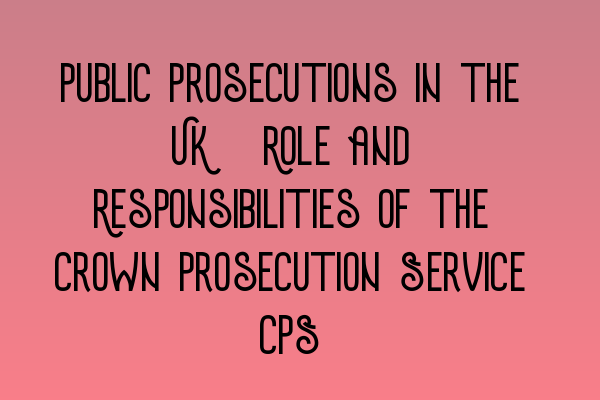Public Prosecutions in the UK: Role and Responsibilities of the Crown Prosecution Service (CPS)
The criminal justice system in the United Kingdom relies on the fair and impartial prosecution of crimes. This crucial responsibility falls on the shoulders of the Crown Prosecution Service (CPS), an independent public authority. In this article, we will explore the role and responsibilities of the CPS in public prosecutions, shedding light on their vital contributions to upholding the rule of law.
What is the Crown Prosecution Service (CPS)?
The Crown Prosecution Service (CPS) is the principal public prosecuting agency in England and Wales. It is responsible for deciding whether to prosecute a case investigated by the police and then presenting the evidence in court. The CPS operates independently from the police, ensuring the fairness and impartiality of the prosecution process.
If you’re preparing for an SQE exam and want to test your knowledge on criminal law, check out our SQE 1 Practice Exam Questions and SQE 1 Practice Mocks FLK1 FLK2 resources.
Role of the CPS in Criminal Prosecutions
The primary role of the CPS is to ensure that the right people are prosecuted for crimes. They carefully review the evidence gathered by the police and make objective decisions on whether there is enough evidence to bring a case to court. This involves assessing the strength and reliability of the evidence, evaluating the public interest, and considering the Code for Crown Prosecutors.
Once the decision to prosecute is made, the CPS takes charge of preparing and presenting the case in court. They work closely with the police, witnesses, and other relevant parties to build a solid case, ensuring that all relevant evidence is disclosed to the defense. The CPS also advises the police during the investigation, helping them gather evidence and build a strong case from the outset.
To adequately prepare yourself for the SQE exams, it’s essential to enroll in professional SQE 2 Preparation Courses and SQE 1 Preparation Courses that cover criminal law and practice.
Responsibilities of the CPS
The CPS carries numerous responsibilities in the criminal justice system. Some of the key responsibilities include:
1. Fair decision-making:
The CPS ensures that decisions to prosecute are made fairly and without bias. They consider all available evidence and apply a consistent approach to decision-making to ensure fairness throughout the prosecution process.
2. Public interest test:
When deciding whether to prosecute, the CPS considers whether it is in the public interest to proceed with the case. Factors such as the seriousness of the offense, the impact on the victim, and the likelihood of a successful prosecution are taken into account.
3. Expert legal advice:
The CPS provides expert legal advice to the police during the investigation process. They help police officers understand the complexities of criminal law and evidence requirements, ensuring that the evidence is gathered lawfully and presented effectively in court.
4. Advocacy in court:
The CPS assigns prosecutors to present cases in court on behalf of the prosecution. These skilled advocates present the evidence, examine witnesses, and make legal arguments to secure a fair and just outcome in criminal trials.
For information on the upcoming SRA SQE Exam Dates, visit our article on SRA SQE Exam Dates.
The Importance of the CPS
The Crown Prosecution Service plays a vital role in the criminal justice system by ensuring that prosecutions are fair, well-prepared, and based on sound evidence. Without the CPS, the justice system would be left incomplete, and integrity may be compromised. By maintaining independence, the CPS upholds public trust in the system and safeguards the rights of both victims and defendants.
Conclusion
The Crown Prosecution Service (CPS) holds a crucial position in the UK’s criminal justice system, making fair and unbiased decisions on whether to prosecute cases. With their expertise in criminal law, the CPS ensures that prosecutions are well-prepared, evidence-based, and uphold the principles of justice. Their commitment to impartiality and professionalism contributes significantly to a fair, effective, and robust legal system in England and Wales.
